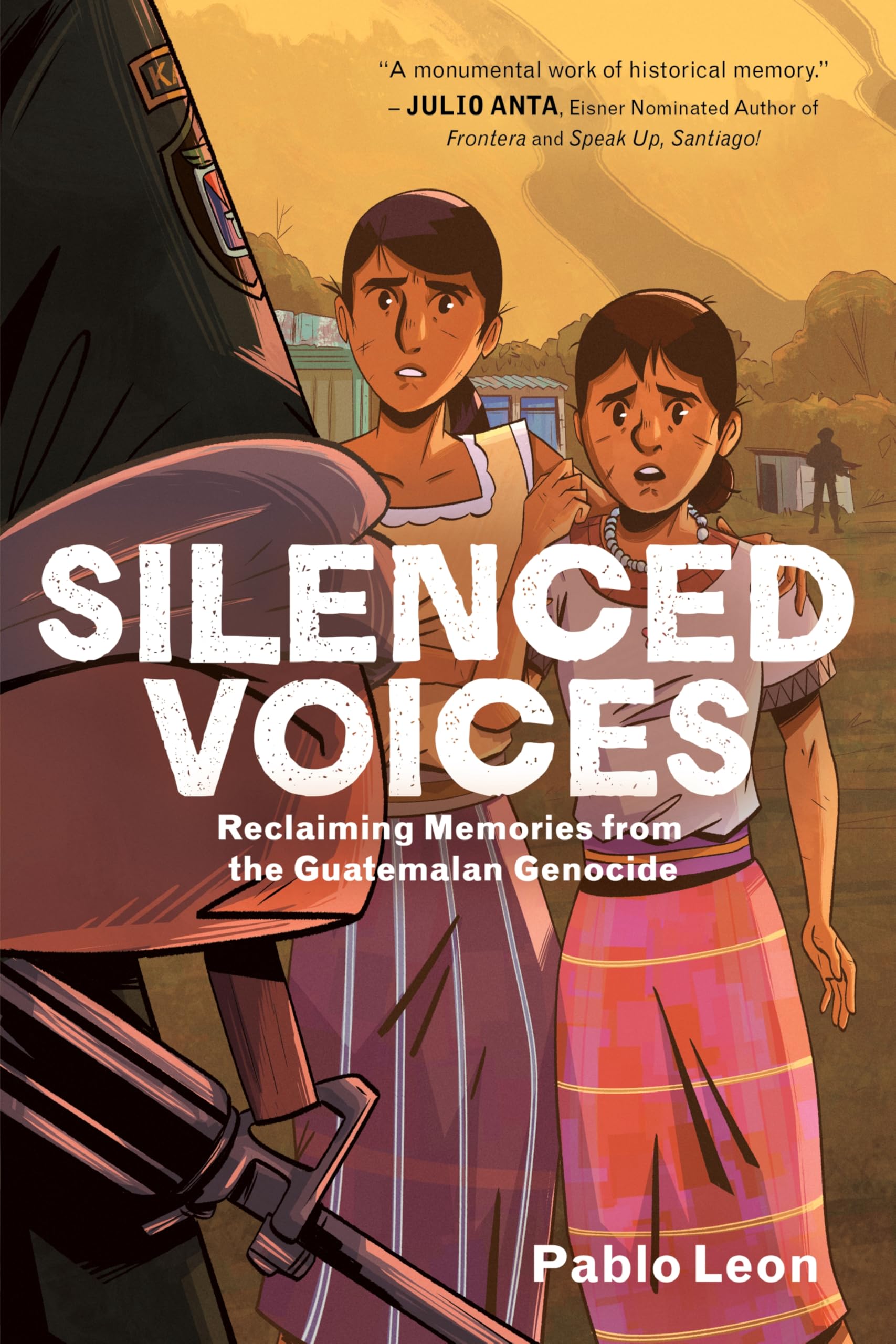Silenced Voices: Reclaiming Memories from the Guatemalan Genocide - Pablo Leon - ★★★.¾

AUTHOR: Pablo Leon
GENRE: Graphic Novel
PUBLICATION DATE: September 2, 2025
RATING: 3.75 stars.
In a Nutshell: An #OwnVoices graphic novel covering a historical genocide that rarely gets attention: the Dos Erres massacre in Guatemala in 1982. Not an easy read, obviously. Despite the text limitations of the format, it covers the context in fair detail. Aimed at teens and young adults, but adults might benefit more from this.
Plot Preview:
2013. Maryland, USA. When Charles is asked by his teacher if his mother had been following the genocide trial of former military leader Efrain Rios Montt on TV, Charles has no idea what he's talking about. All he knows that his mother Clara was from Guatemala, had moved to the USA many years ago, and never wants to talk about her past. Every time Charles and his elder brother Jose raise the topic, Clara dismisses them firmly saying that they were born Americans. But as the trial progresses, the wall around Clara’s heart begins to crumble, and she reveals to her son her traumatic experiences from 1982, when she and her family were residents of Dos Erres, a small mountain village filled with Q’eqchi Mayans.
The graphic novel is split in four chapters, each focussed on one key character. Clara’s chapter takes us to 1982 in flashback.
While there have been several atrocities against humans over the centuries, mostly due to racial or political biases, only a few get prominence beyond their location. The barbaric acts against the Indigenous peoples have especially been brushed under the carpet. It is praiseworthy that this novel brings to light one such genocide that is relatively unknown around the world – the Dos Erres massacre of 1982 in Guatemala. This was just one massacre resulting from the government’s controversial ‘scorched earth‘ policy in which about 200,000 Indigenous and Mayan people were killed.
Prior to this, I have read only one OwnVoices book from Guatemala and that was a contemporary short story collection. I had absolutely no idea that the Central American country’s history involved such crimes. Reading this was an eye-opener in various ways.
The story provides enough details about the events that led to such brutality where neighbour turned against neighbour. The globe is anyway filled with racism and discrimination based on ethnicity, religion, and race, but when these come from within your own country, when your own neighbours look at you as an outsider, the hurt is always greater. More than four decades later, humankind is still struggling on the same path of “othering” their own, forgetting that we are all in this together.
Clara’s character is well-sketched. I like how her arc doesn’t contain only typical victim clichés. Her past trauma does force her to shut herself and her loved ones away from revisiting those days, but this doesn’t turn her into a saint. She has a temper and isn't afraid to show it to her sons, with whom she keeps a strict hand. Her character raises an interesting question – should you keep your children protected from your trauma, even if it means blocking them from knowing an essential part of their roots? A tricky decision this. Intergenerational trauma is not an easy burden to bear.
Jose and Charles are also good characters within their relatively limited roles. Their track shows how modern media and social media can be helpful in resolving certain matters.
While I love the intent of the book and even a fair bit of the execution, a few things could have worked better for me. I’d have liked to know more details of Clara’s initial days in the USA. The boys’ father has supposedly returned to Guatemala, but his character arc is kept too vague. The Guatemalan timeline is a bit tricky as there are many characters at the start and it takes time to figure out not just who’s who but also what’s happening. Also, there are a few back-and-forth conversations that get a little tough to follow sometimes. The political content also becomes a tad confusing at times as the scale of the government’s cruelty was much wider than a single graphic novel could incorporate. Lastly, the ending was a bit too happy considering the circumstances, though I get how this writing choice can be justified by keeping the target age group in mind.
The illustrations are apt for the content. I like how realistically the characters were sketched. No character was purposely beautified to be visually striking. All felt like typical, ordinary individuals. As the book is aimed at teens and young adults, it keeps the content only moderately disturbing. I appreciate that the text mentions several heinous acts but the illustrations don’t sensationalise the matter by adding gruesome images. But even this level is quite distressing.
Overall, while this is not an easy read, it is still an important one, making us aware of a horrific action by a government against its own people, the repercussions of which are still being felt today. Though aimed at teens, the book will also be enlightening to adults unaware of the issue as the approach is fairly mature.
Recommended to readers of OwnVoices graphic novels containing some forgotten historical truths. There is some triggering content herein, so keep your headspace in mind before picking this up. Parents/Teachers/Librarians, this book would work better if paired with adult discussions.
My thanks to HarperCollins Children's Books and HarperAlley for providing the DRC of “Silenced Voices: Reclaiming Memories from the Guatemalan Genocide” via NetGalley. This review is voluntary and contains my honest opinion about the book.


Comments
Post a Comment